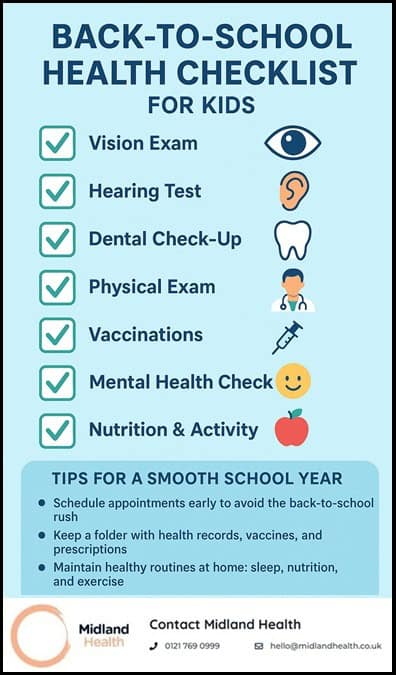The summer holidays are a time for fun, adventure, and relaxation. But as the new school year approaches, it’s important to shift focus to your child’s health and well-being. Returning to school is more than just packing backpacks and buying new uniforms—it’s also a perfect opportunity to ensure your child is healthy, happy, and ready to learn.
Why Health Checks Matter
After weeks of late nights, irregular meals, and outdoor activities, children may develop minor health issues that go unnoticed. A thorough check-up before the school year can help catch potential problems early, ensuring your child can thrive academically and socially. Regular health assessments can also prevent the spread of contagious illnesses in school settings.
Key Childhood Health Checks
Here are some essential health checks to consider as your child heads back to school:
1. Vision and Eye Exams
Good vision is critical for learning. Children may struggle in school if they can’t see the board clearly or read textbooks comfortably. A comprehensive eye exam can detect common issues like near-sightedness, far-sightedness, or astigmatism. Early intervention helps prevent eye strain, headaches, and learning difficulties.
2. Hearing Tests
Hearing problems can affect speech development, attention, and academic performance. Routine hearing screenings can detect issues such as infections or early signs of hearing loss. Early treatment can make a significant difference in a child’s ability to follow lessons and engage socially.
3. Dental Check-Ups
A healthy smile contributes to overall well-being. Dental visits before school ensure cavities, gum disease, or misalignment issues are addressed early. Good oral hygiene also helps prevent discomfort that can interfere with concentration in class.
4. Physical Exams
A general physical exam with a paediatrician is essential to assess growth, nutrition, and overall health. Paediatricians can check height, weight, blood pressure, and body mass index (BMI), and discuss age-appropriate vaccinations and lifestyle habits. This exam also provides a chance to discuss mental health, sleep patterns, and school readiness.
5. Vaccinations
Make sure your child has received all recommended immunisations to protect against preventable illnesses such as measles, mumps, and whooping cough. This not only safeguards your child but also helps protect their classmates.
6. Mental Health and Emotional Well-Being
Returning to school can be stressful. Changes in routine, social pressures, and academic expectations may affect your child’s mental health. Consider a discussion with your child about their feelings, and consult a healthcare professional if you notice anxiety, mood swings, or difficulty adjusting.
7. Nutrition and Physical Activity
After a summer of irregular eating or less structured activity, it’s important to reinforce healthy habits. A paediatrician can provide guidance on balanced nutrition, exercise routines, and healthy sleep schedules to help children perform their best academically and physically.
Tips for a Healthy School Year
- Schedule appointments early: Beat the back-to-school rush by booking exams in advance.
- Keep records handy: Maintain a file with vaccination history, prescriptions, and test results.
- Encourage healthy habits at home: Promote regular sleep, balanced meals, and physical activity.
- Communicate with teachers: Share any health concerns that may affect learning or participation.

Final Thoughts
Returning to school after summer is an exciting time, but it’s also a crucial moment to ensure your child’s health is in check. By taking the time for comprehensive health assessments, parents can help children enter the school year confident, prepared, and ready to succeed. A little preventive care now can make a big difference in their learning and overall well-being throughout the year.

